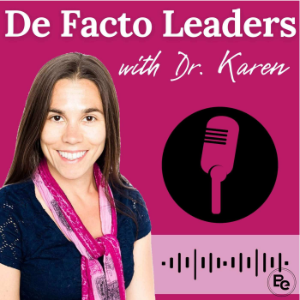
De Facto Leaders
Kids & Family Podcasts
On the De Facto Leaders podcast, host Dr. Karen Dudek-Brannan helps pediatric therapists and educators become better leaders, so they can make a bigger impact with their services. With over 15 years of experience supporting school-age kids with diverse learning needs, Dr. Karen shares up-to-date evidence-based practices, her own experiences and guest interviews designed to help clinicians, teachers, and aspiring school leaders feel more confident in the way they serve their students and clients. She’ll cover a range of topics designed to help you support students' emotional and academic growth and set kids up for success in adulthood, including how to support language, literacy, executive functioning, and how to help IEP teams working together to support kids across the day. Whether you want to learn more effective strategies for your therapy session or classroom, be a more influential leader on your team, or find creative ways to use your skills to advance in your career, Dr. Karen has you covered.
Location:
United States
Genres:
Kids & Family Podcasts
Description:
On the De Facto Leaders podcast, host Dr. Karen Dudek-Brannan helps pediatric therapists and educators become better leaders, so they can make a bigger impact with their services. With over 15 years of experience supporting school-age kids with diverse learning needs, Dr. Karen shares up-to-date evidence-based practices, her own experiences and guest interviews designed to help clinicians, teachers, and aspiring school leaders feel more confident in the way they serve their students and clients. She’ll cover a range of topics designed to help you support students' emotional and academic growth and set kids up for success in adulthood, including how to support language, literacy, executive functioning, and how to help IEP teams working together to support kids across the day. Whether you want to learn more effective strategies for your therapy session or classroom, be a more influential leader on your team, or find creative ways to use your skills to advance in your career, Dr. Karen has you covered.
Language:
English
Contact:
309-212-4862
Website:
https://drkarendudekbrannan.com/
So…can you recommend an app to build my child’s language skills?
Duration:00:27:18
Narrative Intervention: Beyond "Cute" Stories and Lesson Plans (with Jane Gebers)
Duration:00:37:07
What's the point of teaching storytelling? (with Jane Gebers)
Duration:00:36:58
Not seeing generalization? You might be the bottleneck.
Duration:00:26:19
Part 3: What’s the Point of a Language Evaluation? Breaking Down Diagnostic Accuracy, Standards, and Scores (with Destiny Johnson and Tiffany Shahoumian-Ruiz)
Duration:00:34:55
Part 2: What’s the Point of a Language Evaluation? Breaking Down Diagnostic Accuracy, Standards, and Scores (with Destiny Johnson and Tiffany Shahoumian-Ruiz)
Duration:00:31:12
Part 1: What’s the Point of a Language Evaluation? Breaking Down Diagnostic Accuracy, Standards, and Scores (with Destiny Johnson and Tiffany Shahoumian-Ruiz)
Duration:00:29:20
Educational Eligibility, Clinical Diagnosis, and the “Just Be Like Finland” Argument (with Dr. Chrishawn Finister)
Duration:01:01:25
What words should I target in language therapy?
Duration:00:19:19
A Case for Talking about the “Summer Slide” in the Fall (featuring David Schipper)
Duration:00:16:50
What “Biologically Secondary” Means for Literacy Instruction (featuring Dr. Pamela Snow)
Duration:00:24:32
The Relationship Between Language Skills and Discipline Referrals (featuring Dr. Shameka Stewart)
Duration:00:21:13
Building the Literacy Skills Needed for Technology and Life (featuring Tom Parton)
Duration:00:32:11
Engaging Families and the Role of Tech in Addressing Book Deserts (featuring Cassandra Williams)
Duration:00:32:26
Navigating Language Therapy as the Only SLP in the District
Duration:00:24:33
Case Study: Shouldn’t I have language therapy figured out by now?
Duration:00:24:30
Balancing Language, Academic Content Areas, and Executive Functioning (featuring Jill Fahy)
Duration:00:42:50
Part 4: Five Skills to Create Your Executive Functioning Intervention Framework
Duration:00:13:34
Part 3: Five Skills to Create Your Executive Functioning Intervention Framework
Duration:00:20:54
Part 2: Five Skills to Create Your Executive Functioning Intervention Framework
Duration:00:17:57